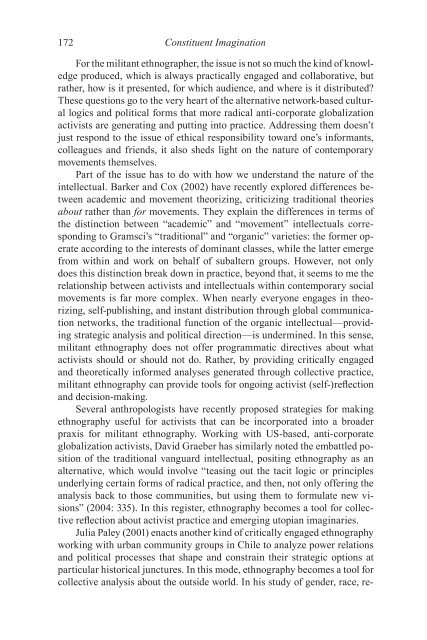CONSTITUENT IMAGINATION - autonomous learning
CONSTITUENT IMAGINATION - autonomous learning
CONSTITUENT IMAGINATION - autonomous learning
Create successful ePaper yourself
Turn your PDF publications into a flip-book with our unique Google optimized e-Paper software.
172 Constituent Imagination<br />
For the militant ethnographer, the issue is not so much the kind of knowledge<br />
produced, which is always practically engaged and collaborative, but<br />
rather, how is it presented, for which audience, and where is it distributed<br />
These questions go to the very heart of the alternative network-based cultural<br />
logics and political forms that more radical anti-corporate globalization<br />
activists are generating and putting into practice. Addressing them doesn’t<br />
just respond to the issue of ethical responsibility toward one’s informants,<br />
colleagues and friends, it also sheds light on the nature of contemporary<br />
movements themselves.<br />
Part of the issue has to do with how we understand the nature of the<br />
intellectual. Barker and Cox (2002) have recently explored differences between<br />
academic and movement theorizing, criticizing traditional theories<br />
about<br />
rather than<br />
for<br />
movements. They explain the differences in terms of<br />
the distinction between “academic” and “movement” intellectuals corresponding<br />
to Gramsci’s “traditional” and “organic” varieties: the former operate<br />
according to the interests of dominant classes, while the latter emerge<br />
from within and work on behalf of subaltern groups. However, not only<br />
does this distinction break down in practice, beyond that, it seems to me the<br />
relationship between activists and intellectuals within contemporary social<br />
movements is far more complex. When nearly everyone engages in theorizing,<br />
self-publishing, and instant distribution through global communication<br />
networks, the traditional function of the organic intellectual—providing<br />
strategic analysis and political direction—is undermined. In this sense,<br />
militant ethnography does not offer programmatic directives about what<br />
activists should or should not do. Rather, by providing critically engaged<br />
and theoretically informed analyses generated through collective practice,<br />
militant ethnography can provide tools for ongoing activist (self-)reflection<br />
and decision-making.<br />
Several anthropologists have recently proposed strategies for making<br />
ethnography useful for activists that can be incorporated into a broader<br />
praxis for militant ethnography. Working with US-based, anti-corporate<br />
globalization activists, David Graeber has similarly noted the embattled position<br />
of the traditional vanguard intellectual, positing ethnography as an<br />
alternative, which would involve “teasing out the tacit logic or principles<br />
underlying certain forms of radical practice, and then, not only offering the<br />
analysis back to those communities, but using them to formulate new visions”<br />
(2004: 335). In this register, ethnography becomes a tool for collective<br />
reflection about activist practice and emerging utopian imaginaries.<br />
Julia Paley (2001) enacts another kind of critically engaged ethnography<br />
working with urban community groups in Chile to analyze power relations<br />
and political processes that shape and constrain their strategic options at<br />
particular historical junctures. In this mode, ethnography becomes a tool for<br />
collective analysis about the outside world. In his study of gender, race, re-
















